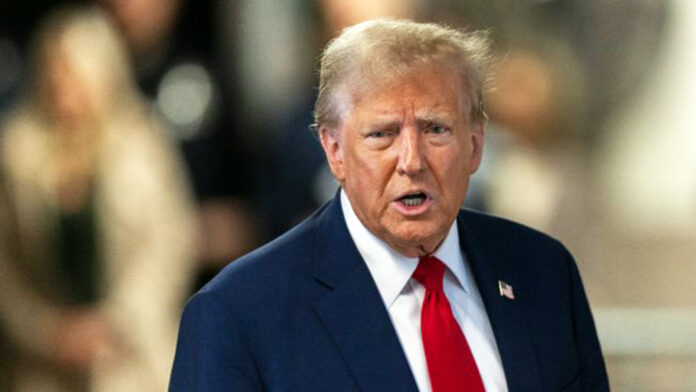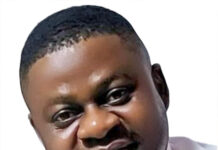“How does it feel to shape the wind to your will?” Doomed vassal Kashigi Yabushige asks warlord Yoshii Toranaga that question in the final episode of the FX series, “Shōgun.”
“I don’t control the wind,” replies Toranaga. “I only study it.” That pays off, enabling Toranaga to foil his rivals though his army is vastly outnumbered.
But even the wiliest 16th century Japanese feudal leader might struggle to predict which winds will prevail in the two biggest news stories of last week: former President Donald Trump’s many-layered encounter with the US court system and the protests roiling prominent US college campuses.
In the midst of what’s expected to be an extraordinarily close election, the spectacle of Trump tramping from courtroom to courtroom is unlike anything seen in American history. The Republican candidate’s odds of victory stand to be swayed by the decisions of judges and jurors in New York, Washington, and possibly even Florida and Georgia. A CNN poll released last week found that 24% of those backing Trump say they could reconsider their support if he is convicted of a crime.
In room 1530 of the Art Deco New York criminal court building, prosecutors began to methodically present their case that Trump interfered with the 2016 election through a covert scheme to buy the silence of porn actress Stormy Daniels.
In the US Supreme Court’s marble-walled chamber in Washington, several justices in the conservative majority appeared to give at least some credence to the former president’s argument that he deserved immunity from the 2020 election interference case brought by special counsel Jack Smith.
To Trump’s delight, the top court’s session dimmed the chances the federal case will go to trial before the election. “It became clear early in Thursday’s argument that there was little support across the bench for a narrow ruling that would be good for only this case,” wrote Steve Vladeck. “As Justice Neil Gorsuch put it at one point, the court needs to articulate ‘a rule for the ages’ … a forward-looking rule so that future presidents will know when they should be worried about future criminal prosecution, and when they shouldn’t.”
“How does it feel to shape the wind to your will?” Doomed vassal Kashigi Yabushige asks warlord Yoshii Toranaga that question in the final episode of the FX series, “Shōgun.”
“I don’t control the wind,” replies Toranaga. “I only study it.” That pays off, enabling Toranaga to foil his rivals though his army is vastly outnumbered.
But even the wiliest 16th century Japanese feudal leader might struggle to predict which winds will prevail in the two biggest news stories of last week: former President Donald Trump’s many-layered encounter with the US court system and the protests roiling prominent US college campuses.
In the midst of what’s expected to be an extraordinarily close election, the spectacle of Trump tramping from courtroom to courtroom is unlike anything seen in American history. The Republican candidate’s odds of victory stand to be swayed by the decisions of judges and jurors in New York, Washington, and possibly even Florida and Georgia. A CNN poll released last week found that 24% of those backing Trump say they could reconsider their support if he is convicted of a crime.
In room 1530 of the Art Deco New York criminal court building, prosecutors began to methodically present their case that Trump interfered with the 2016 election through a covert scheme to buy the silence of porn actress Stormy Daniels.
In the US Supreme Court’s marble-walled chamber in Washington, several justices in the conservative majority appeared to give at least some credence to the former president’s argument that he deserved immunity from the 2020 election interference case brought by special counsel Jack Smith.
To Trump’s delight, the top court’s session dimmed the chances the federal case will go to trial before the election. “It became clear early in Thursday’s argument that there was little support across the bench for a narrow ruling that would be good for only this case,” wrote Steve Vladeck. “As Justice Neil Gorsuch put it at one point, the court needs to articulate ‘a rule for the ages’ … a forward-looking rule so that future presidents will know when they should be worried about future criminal prosecution, and when they shouldn’t.”
Source:cnn
The views expressed in this article are the author’s own and do not necessarily reflect The Chronicle’s stance.









